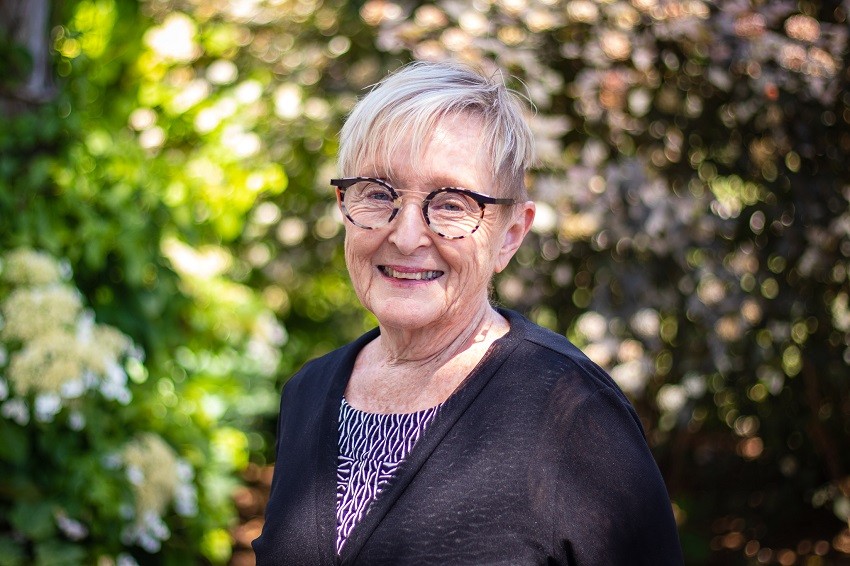Political Science Professor Carol Dauda Retires

University can be tough. But for those in the political science undergraduate program things are a little easier owing to the Political Science Peer Contact program — a program that enlists student volunteers to provide mentorship and social connections for their fellow students, helping them navigate university life and achieve success in the political science program.
This program has helped hundreds of students since its founding in 2006, and for that students have its founder, Professor Carol Dauda, to thank.
Mentorship and helping others has been the hallmark of Dr. Dauda’s career since beginning in the Department of Political Science at the University of Guelph 19 years ago. And it is this passion for her students that will be her legacy as she now moves into retirement.
"Carol Dauda will be greatly missed in the department," said the Department of Political Science Chair Dr. Troy Riddell. "Her devotion to student learning and mentoring, particularly her leadership in creating and guiding the Political Science Peer Contact group, will leave an enduring legacy. Many students have been influenced by Carol's teaching and advising and she has set an excellent example for other faculty members to follow."
Dr. Dauda's desire to help others is also reflective in her research. She has conducted research on a diverse range of topics in both developed and developing countries, including the challenges of gender and sexuality in western liberal democracies and the regulation of the age of consent and child internet abuse. She has also assisted others with their research as an advisor for PhD students, MA students and others.
In addition to the University of Guelph Excellence in Undergraduate Advising Medallion — which Dr. Dauda received in 2019 in recognition of her work establishing the Political Science Peer Contact program – she was also a recipient of the College of Social and Applied Human Sciences Faculty Teaching Award. During her career she has taught 13 different courses across all levels of the graduate and undergraduate programs and has made a lasting impression on countless students.
"Professor Dauda has made an enormous impact on me as both an undergraduate and graduate student at the University of Guelph," said former political science peer Danielle McNabb. "Her passion and wit, matched with her engaging teaching style, and enthusiasm to support students such as through the peer contact program has made her one of the most memorable educators I have ever had!"
It is with fond memories and great thanks that we wish Professor Dauda a happy retirement. The good work that she has done in the College of Social and Applied Human Sciences and for the University as a whole will not be quickly forgotten. Her contributions as part of the University Senate committee and various other academic committees will have a lasting effect.
"She has truly made a lasting impression on the hearts and minds of her students as well as those who had the privilege to work with her. We wish her the best as she begins this new chapter in her life," said Gwen Chapman, Dean of the College of Social and Applied Human Sciences.
Consider a gift to the Carol Dauda Peer Contact Scholarship Fund in honour Dr. Dauda's remarkable career and many accomplishments.
Biography
Carol Dauda earned a PhD in political science from the University of Toronto and joined the Department of Political Science at the University of Guelph in 2001.
Dr. Dauda served on the Senate of the University of Guelph for six years and was Acting Chair of the Admissions and Progress sub-committee of the Senate Broad of Graduate Studies from 2014 to 2015. In service to the CSAHS community, Dr. Dauda was a member of the BA Program Committee, the CSAHS Strategic Planning Committee, and the steering committee for the Hub for Teaching and Learning Excellence. Professor Dauda was chair of the undergraduate program in the Department of Political Science from 2014 to 2018.
Her recent research focuses on how symbols of childhood in relation to adulthood (generation) shape and are shaped by the recent legislation on the age of sexual consent in Canada, the UK , the US and Australia in the midst of contentious politics over sexual diversity and child internet abuse, in particular, child pornography.
Previous research centred on the effect of decentralization on democratic participation in South Africa, Uganda and Zimbabwe. The research encompassed national ministries, local government councils and civil society associations and included a gender analysis.
Selected Publications
- 2013. Providential Understandings of Childhood and Public Policy: The Politics of Generation, Future Adulthood and Moral Regulation of Sexuality in Liberal Democracies. Sexuality & Culture, 17 (2), 275-304.
- 2010. Sex, Gender and Generation: age of consent and moral regulation in Canada. Politics & Policy, 38 (6), 1159-1185.
- 2010. Childhood, Age of Consent and Moral Regulation in Canada and the UK. Contemporary Politics, 16(3), 227-247.
- 2004. The Importance of de facto Decentralization in Primary Education in Sub-Saharan Africa: PTAs and Local Accountability in Uganda. The Journal of Planning Education and Research. 24/1: 28-40.
- 2001. Preparing the ground for a new local politics: the case of women in two African municipalities. Canadian Journal of African Studies. 35/2: 246-81, 2001.